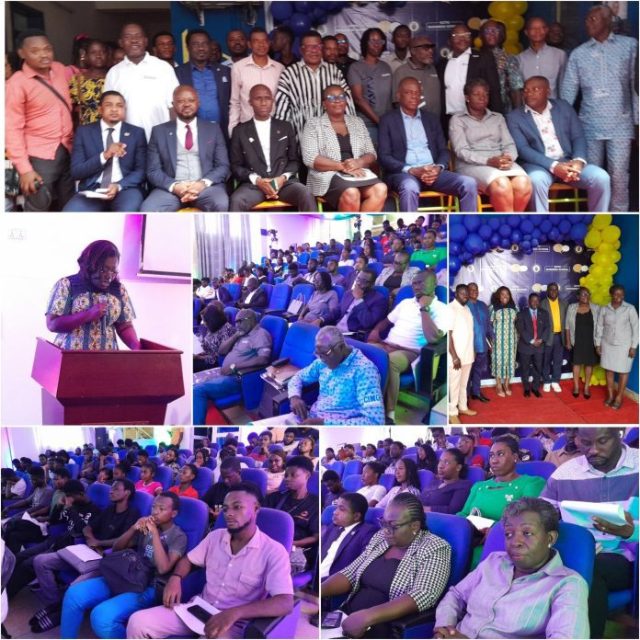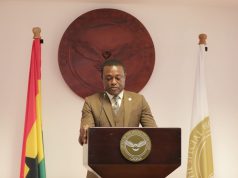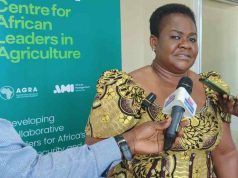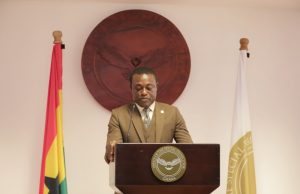Ghana Communication Technology University (GCTU) Business School convened industry leaders and academics yesterday for a pivotal seminar exploring the critical alliance between professional bodies and career advancement, headlined by a senior presidential official.
Held at the university’s main campus at Tesano, off the Circle Nsawm Road under the theme “The Role Of Professional Bodies In Professional And Career Growth,” the event united GCTU with key professional institutes. The collaboration aimed to bridge academic theory with industry certification requirements.
In a compelling keynote address at a GCTU Business School seminar today, Nana Oye Bamfo Addo, Deputy Chief of Staff in charge of Administration, underscored the indispensable role of professional bodies in navigating modern career landscapes and driving Ghana’s economic future. Speaking on the theme “The Role of Professional Bodies in Professional and Career Growth,” Addo addressed a diverse audience of aspiring chartered economists, accountants, lawyers, bankers, marketers, HR experts, and consultants.
“Today’s gathering represents the very engine that drives – or will drive – our economic growth in Ghana,” Addo declared, framing the professions present as fundamental to national prosperity. “Show me a thriving country without economists, procurement experts, or quality standards. Show me flourishing industry without bankers or marketers. It is impossible.”
Mrs Addo issued a stark warning against complacency in a saturated job market, citing Ghana’s unemployment rates. “Merely acquiring a degree or a skill is no longer enough,” she stated. “The first critical step is to continuously adapt to the rapid changes reshaping every profession globally, driven by the technological revolution, especially Artificial Intelligence.”
Drawing a vivid analogy, she cautioned, “You cannot look at a problem in 2025 with the lens of 1883. I know – my son has tried teaching me AI three times, and I still struggle.” She urged the emerging professionals to embrace continuous learning: “We must invest in capacity building and acquire modern skills to remain relevant, effective, and impactful for employers and our local economy.”
The Deputy Chief of Staff emphasized three key areas where professional bodies are crucial:
1. Setting Dynamic Standards & Ethics:
Addo stressed that professional standards cannot remain static, revealing a recent discussion about potentially embedding anti-corruption frameworks in the constitution. Professional bodies, she argued, are central to setting benchmarks, upholding ethics, and maintaining public trust – vital in today’s virtual workplaces shaped by COVID-19.
2. Expanding Horizons Beyond Borders: Addo highlighted the continental opportunities unlocked by the African Continental Free Trade Area (AfCFTA), headquartered in Ghana. “This represents an estimated $500 billion job market,” she reminded the audience. “Africa is looking inward for growth, creating valuable opportunities for professional networking across the continent. Our professional bodies here are key to unlocking this potential.”
3. Being Strategic Career Partners: Moving beyond viewing bodies merely as gatekeepers, Addo outlined their multifaceted support:
Standards & Integrity: Ensuring members adhere to high ethical codes and cutting-edge practices (citing her own need for ongoing Bar training despite 34 years of practice).
Education & Certification: Providing critical pathways to recognized qualifications.
Powerful Networking: Facilitating global connections, conferences, and mentorship (drawing on her experience with international bar associations).
Career Guidance & Advocacy: Offering job resources, mentorship, and acting as a collective voice to protect members’ interests.
“Professional bodies are far more than gatekeepers,” Addo asserted. “They are strategic partners in your lifelong professional journey and career development. Actively engaging with your relevant body is one of the smartest, most empowering investments you can make in your career.”
She concluded by thanking the participating professional bodies and the university for the “innovative” seminar, noting she lacked such opportunities as a student. Urging attendees to “listen with rapt attention” and “maximize this opportunity,” the Deputy Chief of Staff left them with a resonant message: “Professional growth is not a solo journey. It is a shared mission, and professional bodies are here to walk with you every step of the way.”
Professor Ebenezer Malcalm represented Vice-Chancellor Professor Emmanuel Ohene Afoakwa and chaired the proceedings. In his remarks, Prof. Malcalm stressed GCTU’s commitment: “This seminar underscores our mission – not just to educate, but to ensure our graduates are industry-ready and professionally accredited. Professional bodies are the vital link between the classroom and career success.”
GCTU Bridges Academia-Industry Gap with Dual Certification for Students.
In an exclusive interview at the sidelines of the seminar, Professor George Oppong Appiagyei Ampong, Dean of the GCTU Business School, shed light on the institution’s innovative approach to preparing students for the professional world.
According to the Prof Appiagyei, the university is keenly focused on bridging the gap between academia and industry, ensuring that graduates are not only academically qualified but also professionally certified.
Speakihg further, he emphasized that a core tenet of GCTU’s philosophy is the intersection of knowledge and practical application. “While we are teaching our students in the classrooms,” he explained, “we also try to connect and collaborate with professional bodies so that they can offer professional courses to our students.”
Also Prof Appiagyei stated that this strategic collaboration means that by the time students complete their studies, they possess both academic degrees and valuable professional certifications. GCTU has actively co-created its curriculum with these professional organizations, signing Memoranda of Understanding (MOUs) that often include exemptions and fee waivers for students.
“Apart from the individual collaborations we have with all these relevant professional bodies, today was a grand seminar bringing all of them together in a synergy,” Professor Ampong stated, referring to a recent consolidated engagement event. This event aimed to strengthen existing partnerships and allow students, graduate alumni, lecturers, and staff to interact directly with various professional organizations.
Professor Appiagyei highlighted GCTU’s unique niche, contrasting it with traditional universities where graduates often need to seek professional certifications after completing their degrees. “Here, our niche is that we try to provide this opportunity for our students so that whilst in school here, they can also acquire this professional certification,” he said. “So by the time they complete, they have this dual certification, so that they are already prepared for the job market.”
The Dean strongly encouraged all students, lecturers, staff, and alumni to seize this unparalleled opportunity. “You won’t get this unique opportunity in other places, by having all the relevant professional bodies in the country to be at your doorsteps,” he concluded. GCTU’s commitment to providing these integrated opportunities ensures its graduates are well-equipped and highly competitive in the contemporary business landscape.
The seminar featured presentations with representatives from collaborating professional institutes, focusing on practical pathways for certification and lifelong learning. Attendees included students, faculty, and professionals. The event reinforced GCTU Business School’s role in fostering essential industry-academia synergies for Ghana’s economic development.
The professional bodies who featured in the seminar included; Chartered Institute of Tax and Forensic Accountants Ghana| Chartered Institute of Financial and Investment Analyst, Ghana | Chartered Institute of Bankers (CIB) |Prymage Consultancy Ltd.| Institute of Certified Chartered Ecojomists (ICCE), Ghana | Chartered Institute of Marketing, Ghana (CIMG)| Chartered Institute of Human Resource Management (CIHRM)| Chartered Institute of Supply Chain Management |Chartered Institute of Management Accountants (CIMA) and Association of Business Executives (ABE) Global, UK.
About GCTU: Ghana Communication Technology University is a leading public tertiary institution in Accra, Ghana, specialising in ICT, business, and technology education.
By Kingsley Asiedu


















